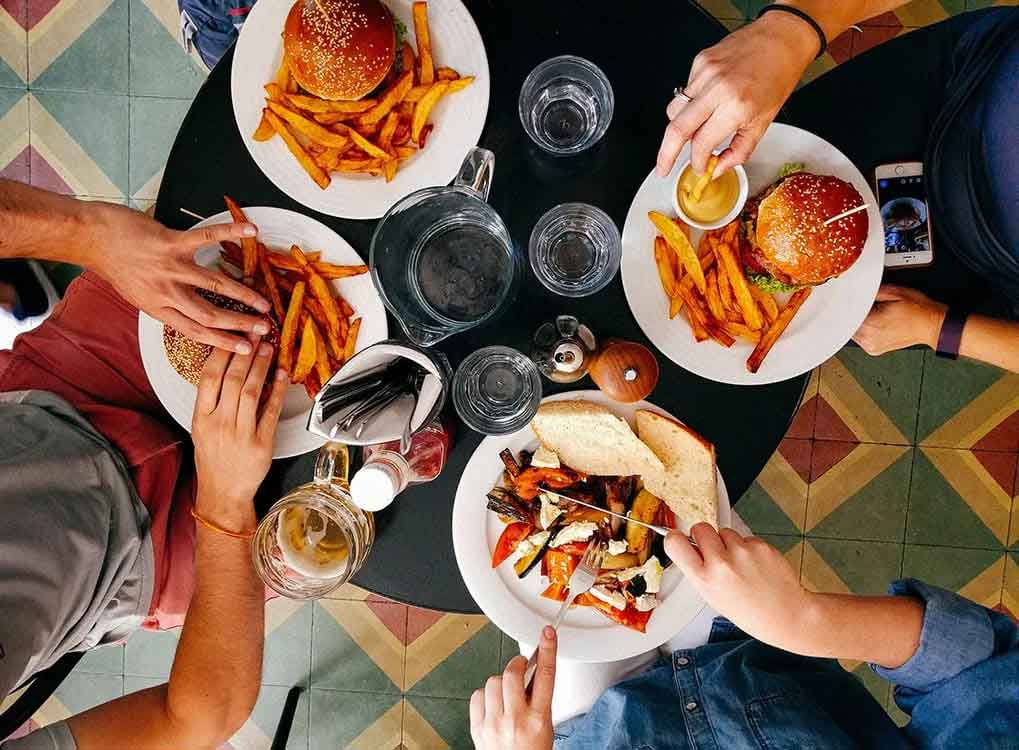It’s normal for your weight to fluctuate between 2 and 5 pounds over the course of a week, but if that number starts to fall out of your comfortable weight range and/or your pants feel tighter, how do you adjust your weight? Want to stop gaining and adjusting your clothes again? The answer is not a juice cleanse, detox or quick fix, don’t waste your money. Much easier than that, trust us (and it won’t cost you). If you try one or all eight of these tips from the experts, the clothes will fit in no time.
Sleep early and keep stress low
Beyond what you eat, assess your sleep and stress levels. Excessive stress and lack of sleep can increase cortisol levels, affect hunger hormones, and contribute to weight gain. In addition, our bodies signal hunger, thirst and fatigue. So you can reach for snacks when you’re tired or really need water or a nap.
Aim for 7-8 hours of sleep per night and set up your system to achieve it. Move your bedtime back in 30-minute increments, avoid looking at your phone at night, and set your screen to nightlight to reduce your blue light exposure. Regular exercise is associated with better sleep and less stress. Just 5 minutes of cardio can reduce anxiety.
Stop restricting certain foods
Dietary restrictions lead to overeating and binge eating. You may limit yourself to gaining weight, but limiting yourself to ice cream all week and eating a pint on Friday night will backfire. The key to weight loss is stopping the cycle of restriction. You can eat at any time, but be mindful of portions and eat without distraction so you can enjoy your meal and savour every bite.
Eat balanced meals
Make sure your diet contains enough protein, fibre and fluid. These are ingredients that help you feel fuller with fewer calories and may make it easier to maintain the calorie deficit needed for fat loss. The food is very high in protein, which means it is high-quality protein for its calorie content. Non-starchy vegetables add a lot of fibre and fluid content to your diet with very few calories. Dairy products, eggs, legumes and fruits are other nutritious ingredients to add to your diet.

Measure weight once a week
According to research, daily self-weighing leads to improved effectiveness with weight reduction maintenance. However, if the daily measuring makes you crazy, only weigh yourself once each week (or instead focus on the other seven tips instead of this one). It helps you keep your attention on the behaviours you need to develop to achieve your objectives by staring you in the face with the number each week. It serves as a reminder to go for exercise, limit yourself to one drink rather than three, and add veggies to your meals.
Take a break from takeout
Average portion sizes in takeout and restaurants have nearly doubled over the last few decades. Condiments and sauces are added up too. Dips and spread lightly, it doesn’t take as much as you might think to add extra flavour. For salads, dip a fork into the dressing and then into the salad and take a small portion of each bite. Be careful with delicious chips, creamy salsas, dips and bread that are served to you as soon as you are seated at a restaurant. By the time your meal is served, you’ve already enjoyed multiple refills and can easily add calories and gain weight.
Read nutrition labels
Labels on food can be misleading. Many packaged foods, such as beverages and yoghurt, are labelled as fat-free but have added sugars that add calories. Instead, take a closer look at nutrition charts and make better choices.
The American Heart Association recommends that a woman should consume less than 24 grams (about 6 teaspoons) of sugar per day and men less than 36 grams (9 teaspoons) of sugar per day. A separate line for added sugars has been added to the nutrition label to make it easier to see your daily intake. Be aware that too much sugar will be stored as fat. So try to keep your intake low by choosing naturally sweet treats and getting plenty of protein and fibre after meals. Aim for 25 grams of protein. Every person’s needs are different.

Track your food for a few weeks
Tracking what you eat is one of the most effective ways you can stop weight gain. Sometimes just adding that mindfulness step is enough.
This is because people often track their meals during a diet or weight loss program, but after the program, the tracking ends as well. The extra calories come back. Calories still matter most, especially as we age and our metabolism slows down.
Add more activity to your day
Specifically, NEAT exercise, which stands for non-exercise activity thermogenesis. This includes all activities that are done throughout his day other than structured exercise, exercise, sleep, or eating. For example, Everyday activities you might not even think about, such as walking, cleaning, climbing stairs or fidgeting randomly.
Visit Specialty Care Clinics for weight loss solutions.
